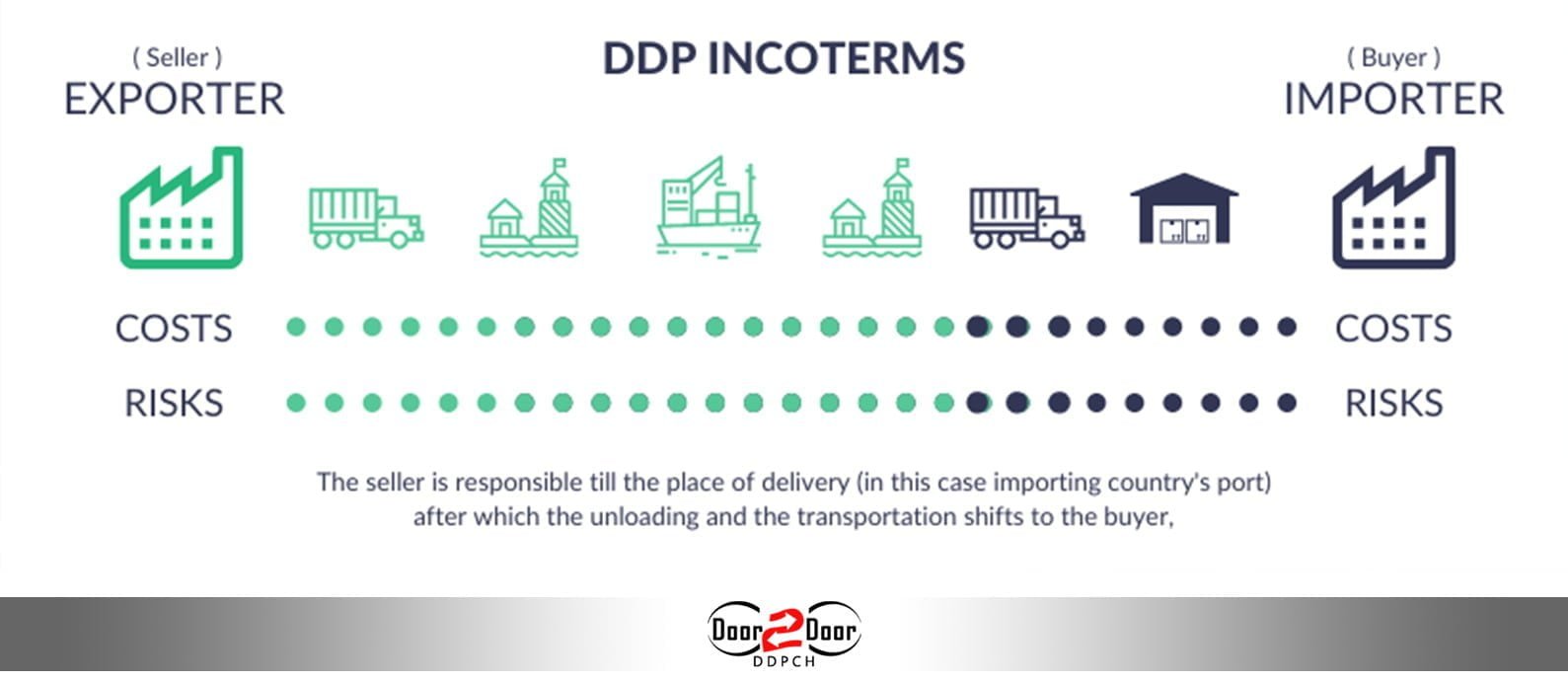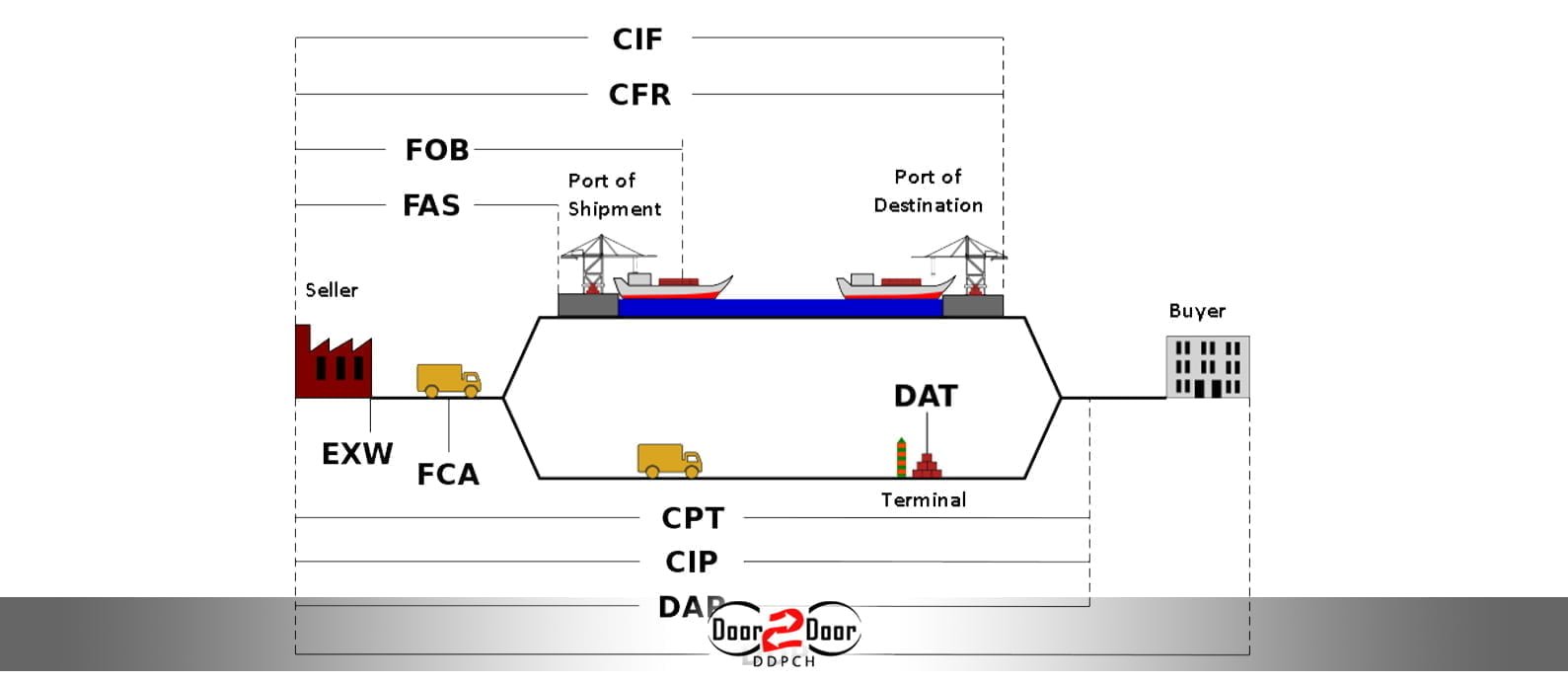Introduction
Incoterms or international commercial terms are international contracts intend for export, import and trade. Two Incoterms CPT and DDP are different concepts that we intend in this article to review the definitions and a general comparison between each. Stay with us until the end of the article.
In the world of international trade, understanding Incoterms (international commercial terms) is essential for smooth and successful transactions. Two commonly used Incoterms are Delivery Duty Paid (DDP) and Carriage Paid To (CPT). In this article, we will delve into the definitions and provide a comprehensive comparison between these two terms. Whether you are a buyer or a seller, having a clear understanding of DDP and CPT is crucial for making informed decisions and ensuring efficient shipping processes. Join us as we explore the similarities, differences, advantages, and disadvantages of DDP and CPT, and discover which Incoterm is best suited for your business needs in 2023.
What is DDP

DDP or Incoterm Delivery duty paid refers to the rules that the seller assumes all responsibilities for the delivery of the goods, including all costs, insurance tax charges and delivery in general to the buyer. In this case, the seller must do both export and import. Of course, in this method, the seller can decide to not insure the goods before transportation and leave the insurance to the buyer.
In Incoterm DDP, the buyer is exempt from paying any taxes, fees or charges until the product arrives, so only has to pay the cost of the calculated product according to the transaction.
comparison between CPT and DDP , DDP is the only Incoterms that has all the responsibilities of clearance of goods after import from the buyer and all these steps will be the responsibility of the seller.
Advantages of DDP
DDP benefits are divided into two parts: buyer benefits and seller benefits:
Buyer benefits
- The risk of buying is much lower than other incoterms
- The clearance fee will be settled at the time of the transaction
- No need to pay additional costs such as administrative and tax costs
Seller benefits
This method often does not interfere with the buyer and the seller can supply the products in any way he wants and send them to the destination for the buyer. In this case, the only advantage of the process intends for the seller.
Disadvantages of DDP
Of course, DDP also has disadvantages that we will not see in other Incoterms.
Disadvantages of the buyer
- comparison between CPT and DDP This incoterm requires accurate knowledge and ability of the seller to import details in the destination country, so if the seller is not able to clear the goods in the destination country, DDP not uses in general.
On the other hand, some tax contracts in the destination country are only payable to certain individuals, so the seller is not able to provide DDP services to the buyer in this way. - If there is a problem with the products or the shipping process distrubs, the buyer will have no way to change the process.
- In this incoterm, the seller may pay any additional costs to the buyer according to the work done to send the products to the destination.
Disadvantages of the seller
This method is one of the most difficult methods for the seller, so many sellers may refuse to provide a DDP for the buyer. For example, providing all customs fees, shipping and shipping costs, tax costs and even providing clearance and shipping documents and other items are all the responsibility of the seller, so the amount of work and responsibilities of the seller in this method is very high.
What is CPT
CPT Incoterms is an international standard trading term that defines the seller as the first person responsible for the transfer of the product to the shipping company or intermediary. In this Incoterms, unlike DDP, the seller is responsible for delivering the products to the shipping company, and from then on, all responsibilities transfer to the company or intermediary.
In CPT, the seller must transit the products to the destination country and deliver them to a company or person who agrees between seller and buyer. Note that the difference between this method and DDP is when the products available to the shipping companies. Suppose the seller in CPT sends the product to the buyer through three different channels. In each channel, the responsibility is assigned to the transferring company and any problems are the responsibility of the company, but in DDP, all the responsibilities in each channel will be the responsibility of the seller.
comparison between CPT and DDP the risk of transporting the goods after delivery to the sending company changes from seller to buyer with the initial condition that the channel or company or the transferor select by agreement of the parties.

Advantages of CPT
in the advantages and disadvantages of DDP, different advantages and disadvantages considers in CPT for the seller and the buyer:
Seller benefits
- There is no need to ensure products from the seller
- When the products reach the local terminal and the transferring company, the seller loses responsibility
- The seller can also coordinate and offer his transfer company with the buyer
Buyer benefits - The potential risk of receiving goods in this way is lower than other incoterms for shipping from China.
- The buyer does not need to manage the transit of products to the destination
- The buyer does not need to calculate the tax costs and the cost of exporting products and shipping from China
- Due to the insurance of the products by the sending company, the buyer can deliver the products more safely.
Disadvantages of CPT
Disadvantages of the buyer
- In this case, the buyer is responsible for the products when they enter the terminal or the shipping company if the buyer can not be directly involved in the delivery of goods by the company.
- The costs of the differentiated company for the transfer are never known in advance and may involve a large initial cost for the buyer.
Disadvantages of the seller - The seller is responsible for managing and paying all costs while shipping products from China to the terminal
- Calculate all costs for sending and clearing goods is the responsibility of the seller.
Comparison of CPT and DDP

In general in the case of CPT and DDP incoterms for shipping from China, the two methods place more responsibility on the seller, but the difference arises when the product is delivered to the company or transmission channel.
In DDP, all cases and even the decision to insure or not the products and their transit in the destination country is the responsibility of the seller, which in addition to the disadvantages of providing transfer methods and calculating and paying all costs can be for The seller is very time consuming but it is a great way for buyers who do not want to get involved to get the goods. On the other hand, CPT Incoterms can leave the buyer free to choose the channels sent and the transit intermediary company to agree on this with the seller.
Both methods are very suitable for shipping from China, but if you are a buyer who wants to buy and receive only the product without the slightest interference in sending and clearing the goods, it is better to use DDP Incoterms.
Comparison of CPT and DDP at a glance
Five Crucial Factors to Consider When Choosing Between CPT and DDP Incoterms in 2023
- Your Role in the Transaction: Are you the seller or the buyer? Your role will significantly influence which Incoterm is best for you, considering the distribution of responsibilities under each term.
- Resource Availability: Do you have the resources and expertise necessary to handle import procedures? If not, DDP may be a more suitable choice.
- Risk Tolerance: Are you prepared to assume the risk once the goods are handed over to the carrier? If you prefer to minimize your risk exposure, DDP may be the better option.
- Cost Implications: Consider the potential costs associated with each Incoterm, including freight charges, insurance costs, customs duties, and other related expenses.
- Control Over the Process: How much control do you wish to have over the shipping process? If you prefer greater control, you might lean towards CPT. On the other hand, if you’d rather have a hands-off approach, DDP could be the better choice.
However, for businesses that prefer a more hands-off approach or lack the necessary resources to handle complex import procedures, DDP may be a better fit. With DDP, the seller is responsible for all costs and risks up to the point of delivery at the buyer’s location. This includes freight costs, insurance, customs duties, and import clearance. As such, DDP can provide peace of mind to buyers, as the majority of the responsibilities remain with the seller. Ultimately, choosing the best Incoterm for your business in 2023 will depend on the specific dynamics of your transactions and the strategic goals of your organization.
CPT vs DDP: Which Incoterm is Best for Your Business in 2023?
Navigating the world of international trade requires a firm understanding of Incoterms. Two such terms – Carriage Paid To (CPT) and Delivery Duty Paid (DDP) – offer distinct advantages and risks, depending on the nature of your business and your role in the transaction. CPT is often preferred by businesses that have the capability to handle import procedures and wish to exercise more control over the shipping process. This Incoterm allows the buyer to assume responsibility after the goods have been delivered to the carrier, enabling the buyer to manage any potential risks or additional costs that may arise thereafter.
However, for businesses that prefer a more hands-off approach or lack the necessary resources to handle complex import procedures, DDP may be a better fit. With DDP, the seller is responsible for all costs and risks up to the point of delivery at the buyer’s location. This includes freight costs, insurance, customs duties, and import clearance. As such, DDP can provide peace of mind to buyers, as the majority of the responsibilities remain with the seller. Ultimately, choosing the best Incoterm for your business in 2023 will depend on the specific dynamics of your transactions and the strategic goals of your organization.
How DDPCH Group can Assist with CPT and DDP
DDPCH Group, an industry leader in DDP and CPT services, guarantees secure and prompt product deliveries from China. The company’s seasoned professionals guide clients through the complex decision-making process between DDP and CPT, providing tailor-made solutions for each unique requirement.
For DDP transactions, DDPCH Group takes full charge of delivery obligations, providing a hassle-free experience for buyers. In contrast, for CPT transactions, they efficiently coordinate with shipping companies to ensure a smooth transition of responsibilities.
By staying updated with industry trends, including SEO changes, DDPCH Group can consistently offer clients relevant and effective advice and solutions. Their dedication to quality and client satisfaction makes them a top choice for assistance with DDP and CPT services.

Conclusion
Understanding the differences between DDP and CPT Incoterms is crucial for businesses engaged in international trade. The choice between these terms can significantly impact responsibilities, costs, and risk management. DDP places more responsibilities on the seller, making it suitable for buyers who prefer minimal involvement in the shipping process. On the other hand, CPT gives buyers more control over the shipping process, making it ideal for those capable of handling import procedures.
DDPCH Group is a leader in providing DDP services and incoterms so that customers can easily receive their products for shipping from China in the fastest possible time with high security and without the least hassle. The quality of our work process in providing DDP and CPT services is high, and you can rely on our services to purchase and clear your goods. If you have any questions about the introduced Incoterms, you can ask your questions through the contact us link on the website.
Incoterms, or International Commercial Terms, are a set of rules that define responsibilities of sellers and buyers in the international sale of goods.
CPT stands for Carriage Paid To. It requires the seller to deliver the goods to a carrier and pay for the transportation to a specified destination.
In CPT, insurance is not mandatory for the seller. In DDP, the seller often covers insurance as they are responsible for the goods until delivery is completed.
In DDP, the seller is responsible for all customs procedures, including the payment of import duties and taxes. With CPT, once the goods are handed over to the carrier, customs clearance becomes the responsibility of the buyer.
Yes, both CPT and DDP can be used irrespective of the mode of transportation.
Yes, there are 11 Incoterms, and the choice depends on the specific needs and agreement between the buyer and seller. However, CPT and DDP are often preferred due to their clear delineation of responsibilities.
The Incoterm does not directly impact the quality of goods. However, DDP could indirectly affect quality if the seller chooses slower, cheaper transport to minimize costs, potentially leading to longer transit times.
The volume and direction of global trade influence the demand for freight forwarding services. Changes in trade agreements or disruptions can significantly affect the industry.
In DDP, all taxes associated with the import of goods are the seller’s responsibility. However, in CPT, the buyer is liable for import taxes after the goods are handed over to the carrier.
It depends on your business needs and capacity. If you have the expertise to handle import procedures and wish to control the shipping process, CPT may be preferred. If you’d rather not get involved in the shipping process, DDP would be a better choice.
In CPT, the risk transfers to the buyer once the goods are handed to the carrier. In DDP, the seller bears the risk until the goods are delivered.

